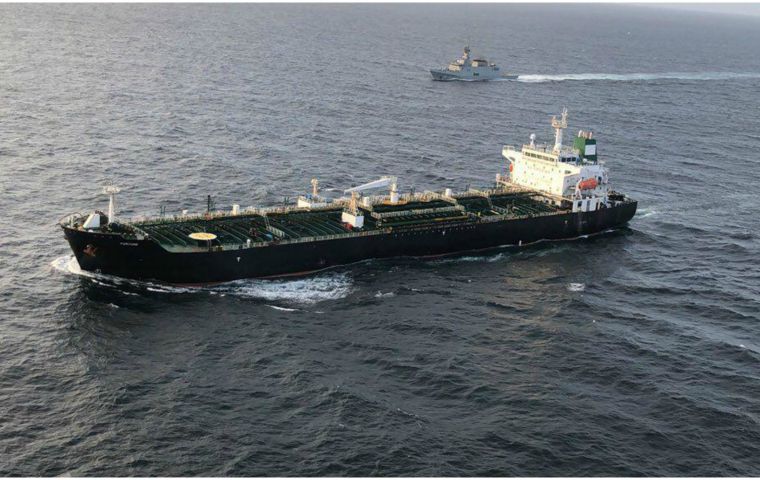MercoPress. South Atlantic News Agency
US prosecutors file a lawsuit to seize gasoline aboard four tankers heading to Venezuela from Iran

United States prosecutors filed a lawsuit to seize the gasoline aboard four tankers that Iran is trying to ship to Venezuela, the latest attempt by the Donald Trump administration to increase economic pressure on the two U.S. foes.
The lawsuit, filed late on Wednesday in the U.S. District Court for the District of Columbia, was followed on Thursday by a warrant issued by U.S. District Judge James Boasberg for the seizure of the more than 1.1 million barrels of gasoline in the four vessels.
Legal sources said the gasoline could likely only be seized by U.S. authorities if the tankers enter U.S. territorial waters. But they said the actions could help push other countries to cooperate in seizing the fuel.
Gasoline shortages in Venezuela, like Iran a member of OPEC, have grown acute due to U.S. sanctions, and the country has undergone an economic collapse. Still, Maduro has held on.
In the civil-forfeiture complaint, U.S. federal prosecutors aim to stop delivery of Iranian gasoline aboard the Liberia-flagged Bella, Bering, Pandi and Luna, according to the lawsuit, first reported by the Wall Street Journal.
Boasberg issued the warrant for the seizure of the gasoline in the tankers based on probable cause that the fuel is forfeitable, the Justice Department said.
The lawsuit also aims to stop the flow of revenues from oil sales to Iran, which Washington has sanctioned over its nuclear program, ballistic missiles, and influence across the Middle East. Tehran says its nuclear program is for peaceful purposes.
Washington has increasingly been using civil forfeiture to stop illicit trade involving Iran and Venezuela, complementing its sanctions policy, according to Evelyn Sheehan and Beau Barnes at Kobre and Kim, a firm specialized in disputes and investigations.
“U.S. policy towards both Venezuela and Iran is focused on denying both regimes access to foreign currency,” said Sheehan, who is also a former U.S. Department of Justice prosecutor.
“Intercepting gasoline cargoes with civil forfeiture is a novel way to achieve that goal.”
Zia Faruqui and two other assistant U.S. attorneys allege in the lawsuit that Iranian businessman Mahmoud Madanipour, affiliated with Iran’s Islamic Revolutionary Guard Corps, or IRGC, helped arrange the shipments by changing documents about the tankers to evade U.S. sanctions.
The lawsuit says that since September 2018, the Revolutionary Guards’ elite Quds Force has moved oil through a sanctioned shipping network involving dozens of ship managers, vessels and facilitators.
Profits from the shipments support the “full range of nefarious activities, including the proliferation of weapons of mass destruction and their means of delivery, support for terrorism, and a variety of human rights abuses, at home and abroad,” the lawsuit said.
The vessels carrying Iranian gasoline engaged in ship-to-ship transfers to evade sanctions. The Pandi, for example, engaged in such a transfer in Port Khalid in UAE to load the Iranian gasoline surreptitiously, the lawsuit said.
It was not immediately clear whether or how the Trump administration would move to seize the gasoline. The U.S. government must prove the fuel is forfeitable under law in a civil proceeding for it to seize it permanently.




Top Comments
Disclaimer & comment rulesCommenting for this story is now closed.
If you have a Facebook account, become a fan and comment on our Facebook Page!